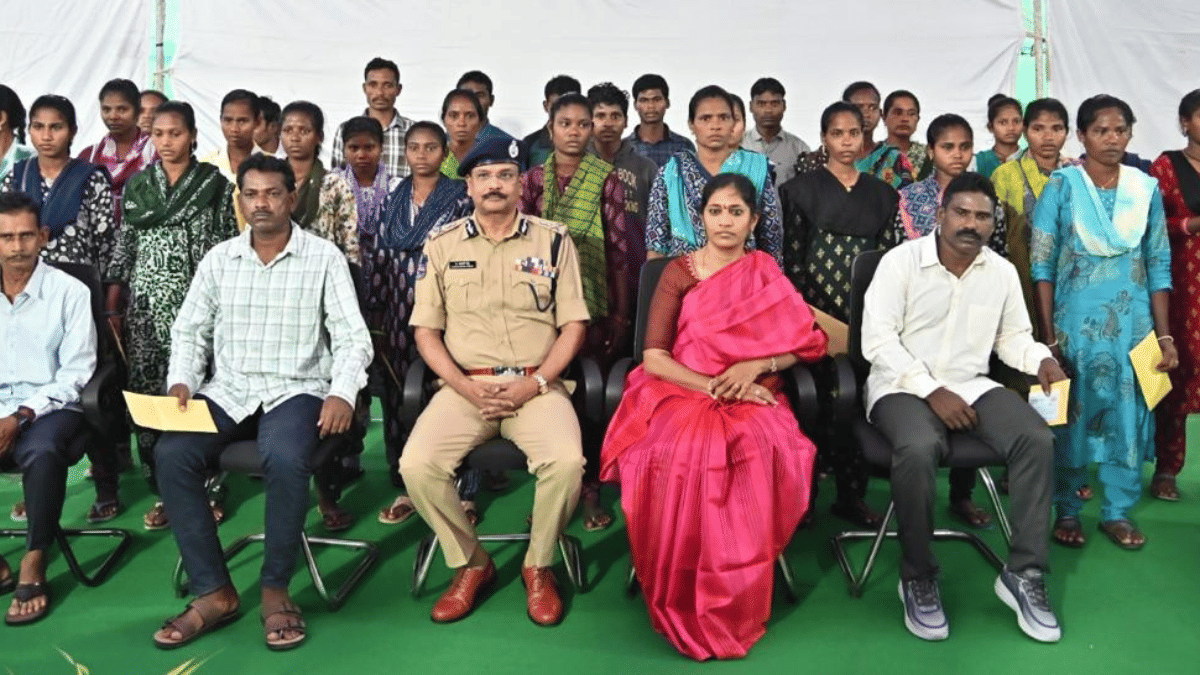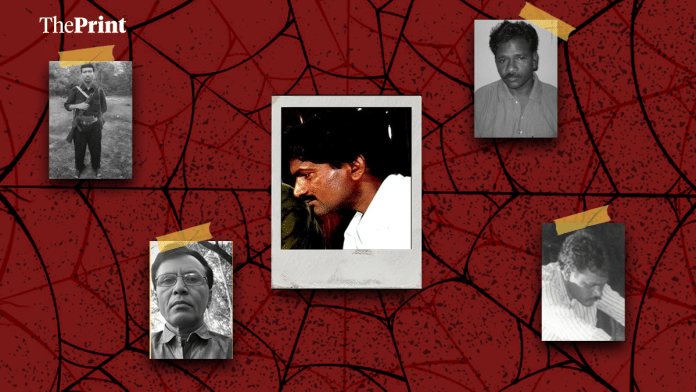New Delhi: Muchaki Somada alias Erra was overcome with emotion as he stood in the office of the Telangana police chief on a Saturday afternoon earlier this month. Out of the shadows of Left Wing Extremism, the 42-year-old Maoist had come to officially lay down his arms before Director General of Police Shivadhar Reddy and senior officers.
“Offered a chair to sit among senior officers, Erra had tears in his eyes. More than anything, it highlighted how a simple courtesy was a remarkable event for him,” a Telangana Police official told ThePrint.
Erra was a state committee member of the banned Communist Party of India (Maoist), deployed in South Bastar region as a divisional committee secretary.
He was active in Bijapur, Sukma and Dantewada districts before he entered Telangana and surrendered.

A week earlier, security forces killed the Maoist commander-in-chief, Madvi Hidma, in an encounter in Andhra Pradesh’s Alluri Sitarama Raju district.
Hidma’s encounter was quickly followed by a raid at the suspected hideout of the de facto chief of the Maoist outfit, Tirupati Tirupati alias Devujee. While Devujee was not found, Andhra Pradesh police nabbed Maoist cadres who were once part of his security team.
Officials say this carrot-and-stick policy—continued operations against armed Maoists and negotiations and persuasion to secure surrenders by those ready to give up arms and join the mainstream—has eroded both the cadre base of the outfit as well as its leadership.
Also Read: Naxals are Indian citizens. Ruthless force is not the way to solve the problem
Vertical split in CPI (Maoist)
Security forces were already on an intense drive to weed out Left Wing Extremism, and a March 2026 deadline declared by Union Home Minister Amit Shah to end Naxalism in the country added further impetus. Under the renewed focus, forces had their first massive success when the general secretary of the CPI (Maoist), Nambala Keshava Rao, also known as Basavaraju, was gunned down in an operation in Abujmarh in May.
Basavaraju’s end also brought to the fore faultlines and differences of opinion among senior Maoist leaders in the central committee.
There was virtually a vertical split in the outfit, with cadres and leaders taking sides between Mallujola Venugopal (alias Bhupati) and Thippiri Tirupati, alias Devujee.
Cadres aligned to Bhupati, who also goes by the name Sonu, advocated giving up arms, continuing peace talks with the government, and even declaring a unilateral ceasefire. On the other hand, cadres aligned with Devujee continued to support armed resistance and refused Sonu’s clarion call to surrender.
“Sonu’s call for surrender to Devujee angered him (Devujee) so much that he made a message reach Sonu saying that if he were compelled to give up arms and surrender, he (Sonu) would be killed with the same weapon,” said a police officer privy to the matter.
Sonu surrendered before Maharashtra Police in Gadchiroli district earlier last month. Weeks later, another key central committee member (CCM), Pulluri Prasad Rao alias Chandranna, surrendered before Telangana Police.
“Sonu was a political figure among the Maoist cadres, but Chandranna was the key man looking after logistics and the communication channel between the CCMs hiding in different parts of the country. He was the point of contact for CCMs and was possibly the biggest surrenderer among the senior Maoist leaders,” a police official said.
With the surrenders of both Sonu and Chandranna, the political leadership of the Maoists has all but collapsed, police and intelligence officers said.
“The Maoists developed their ground because the Telugu leadership was able to convince, first the poor in the undivided Andhra Pradesh, and then the tribals in Chhattisgarh and Madhya Pradesh, that the government took away their land and rights,” another senior official said. Adding, “Both the conditions and welfare system in the deeper pockets of these states have improved. To add to that, Maoist leaders still surviving lack the charisma of previous leaders such as Kishenji to influence the tribals.”
Since January 2024, security forces have eliminated more than 300 Maoist cadres and leaders, including top leaders Basavaraju, Hidma and several other central committee members. Also, more than 800 cadres, including Sonu and Chandranna, have surrendered.
Devujee, the de facto chief
Having joined the movement as a member of the erstwhile People’s War Group (PWG), Devujee went on to become a member of the Gadchiroli divisional committee in 1990 and was promoted to the rank of secretary of the Dandakaranya special zonal committee (DKSZC) in 1999. In 2001, he was inducted into the central military commission of the CPI (Maoist), which he went on to lead in 2019 and continues to do so to date.
In 2023, he was inducted into the politburo, CPI (Maoist)’s highest decision-making body.
He was one of the contenders alongside Sonu to take over the role of general secretary after Basavaraju’s encounter. However, Devujee was made the de facto chief as Sonu headed in the direction of surrendering before the authorities; though officials are yet to confirm that the Maoists have declared Devujee their next general secretary.
Officials say Devujee was the military strategist and hence was preferred by Basavraju, who himself had an army outlook on the banned outfit. “Devujee was promoted into the central committee and politburo because of his military crafts and strategies. Hidma was the executioner across the Bastar region based on his ideas,” a security official said.
Officials added that the Maoists can’t survive purely as a military outfit.
“Devujee managed to call shots militarily because the party had a functional political leadership. That leadership is no more or damaged beyond repair. The current crop of leaders either lacks political heft or they are not in good health to keep the party intact,” another official said.
Among the remaining central committee members, officials point out, Muppala Lakshman Rao (alias Ganapathy) and Malla Raji Reddy (alias Sangram) are too old and in poor health. Another surviving central committee member, Ganesh Uikey, is also not well-suited to participate in party activities actively. Two others—Pathiran Manjhi and Misir Besra—are based in Jharkhand and are unlikely to lead the movement, officials said.
Devujee, on the other hand, is critical to security forces and governments’ efforts to end the violence by Maoists. “He lacks the acumen to keep the party intact politically, but he can ensure the state committee cadres lay low and function in small groups. His surrender or encounter is significant for the forces to succeed and to prevent a regrouping of armed Maoists in future,” another official said.
Some ‘roadblocks’ to March 2026
While there is consensus among security and intelligence officials in all LWE-affected states that the CPI (Maoist) cannot survive in its earlier form for long, and the March 2026 deadline is very much on track, there is also shared concern over Telangana State Committee members who have remained elusive.
“Although they are not very senior among the leadership group of the Maoists, they are more than capable of forming smaller groups and keeping the movement active,” an intelligence official from one of the states told ThePrint.
And these Telangana State Committee members, including secretary Bade Chokka Rao alias Damodar, have become major obstacles to securing further Maoist surrenders.
“They have not budged, and have refused to surrender as of now. Their surrender will prove to be a final setback for the party in Telangana, where it all developed into a formidable outfit,” the official said.
Telangana DGP Shivadhar Reddy also emphasised the importance of their surrender.
“There are 10 state committee members, and the sooner they surrender, the better. Those who surrender will have complete security, and they will not be harassed in any way,” Reddy told the press conference after Erra’s surrender on 22 November.
(Edited by Ajeet Tiwari)
Also Read: Forces dealt a big blow to Maoist top rung with Chalapathi killing. But many big guns still at large






